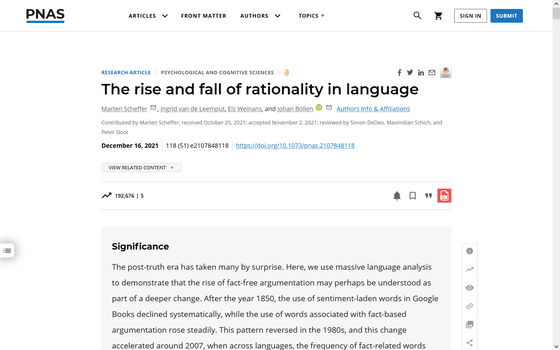Clearly before the rise of SNS, the words used by people shifted from logical ones such as 'data' and 'analysis' to emotional ones such as 'believe' and 'think'

A study of millions of books published since 1850 found that since the 1980s, the tendency to use more emotional words than logical words has increased. This trend accelerated around 2007 when SNS started to become popular.
The rise and fall of rationality in language | PNAS

'We conclude' or 'I believe'? Rationality declined decades ago - WUR
Marten Scheffer of Wageningen University, who analyzed the words used in books from 1850 to 2019, found that since 1850, the use of words related to rationality, such as ``assessment'' and ``conclusion,'' has increased. We found a decrease in words related to human experience, such as 'feel' and 'believe.' However, it turns out that this trend reversed from around 1980, and then emotional words increased until 2019.
Below is a graph showing the words Mr. Sheffer picked up and the percentage of those words appearing by year. The upper part is a word about rationality, and words such as 'analysis', 'data', 'limit' and 'result' are picked up. At the bottom are words related to emotions, such as 'imagine', 'wisdom', 'mind' and 'think'.

The trends from 1850 to 1980 are the verbal effects of the rapid development of science and technology that began to attract attention to the scientific approach and its gradual permeation into culture, society, education and politics. Scheffer speculates.
The usage rate of words related to emotions and intuition has increased at an accelerating pace around 2007, but it is thought that several factors are involved in this. This time, Mr. Sheffer is investigating the books recorded in Google's full-text search service 'Google Books'. There is a past that it has changed from 'something' to 'things of publishers who deposit directly with Google'. For this reason, trends around 2007 may not simply reflect the trends of the time.
However, Mr. Sheffer points out that it is necessary to consider that around 2007 was also the time when the global spread of social media began. With the advent of SNS, subjective emotions such as 'happiness' have become more visible to people, and at the same time, various principles and claims have spread among people, so it is possible that word trends have changed accordingly. It is possible.

These tendencies of words also appeared in a survey focused on 'non-fiction', and the trends were consistent even when only the 'New York Times', which is thought to rarely cover fiction, was found to be consistent. Sheffer concluded that the findings likely reflect the true state of language change, regardless of fiction or non-fiction.
However, Scheffer adds that his observations are purely speculative, as language is influenced by many social and cultural changes. ``Importantly, the trend reversal we found has its origins decades before the rise of social media,'' Scheffer said. It is thought that factors contributed to the stagnation of rationality around 1980. From now on, while clearly recognizing the importance of intuition and emotion, at the same time, we will make maximum use of the power of rationality and science, Society may need to find a new balance to address the topic.'
Related Posts:
in Posted by log1p_kr







